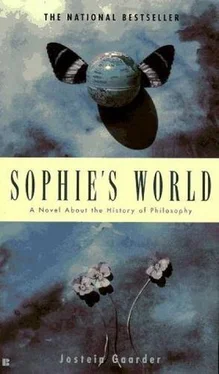Jostein Gaarder - Sophie's World - A Novel About the History of Philosophy
Здесь есть возможность читать онлайн «Jostein Gaarder - Sophie's World - A Novel About the History of Philosophy» весь текст электронной книги совершенно бесплатно (целиком полную версию без сокращений). В некоторых случаях можно слушать аудио, скачать через торрент в формате fb2 и присутствует краткое содержание. ISBN: , Издательство: BERKLEY BOOKS, NEW YORK, Жанр: Философия, на английском языке. Описание произведения, (предисловие) а так же отзывы посетителей доступны на портале библиотеки ЛибКат.
- Название:Sophie's World: A Novel About the History of Philosophy
- Автор:
- Издательство:BERKLEY BOOKS, NEW YORK
- Жанр:
- Год:неизвестен
- ISBN:0-425-15225-1
- Рейтинг книги:4 / 5. Голосов: 1
-
Избранное:Добавить в избранное
- Отзывы:
-
Ваша оценка:
- 80
- 1
- 2
- 3
- 4
- 5
Sophie's World: A Novel About the History of Philosophy: краткое содержание, описание и аннотация
Предлагаем к чтению аннотацию, описание, краткое содержание или предисловие (зависит от того, что написал сам автор книги «Sophie's World: A Novel About the History of Philosophy»). Если вы не нашли необходимую информацию о книге — напишите в комментариях, мы постараемся отыскать её.
Sophie's World: A Novel About the History of Philosophy — читать онлайн бесплатно полную книгу (весь текст) целиком
Ниже представлен текст книги, разбитый по страницам. Система сохранения места последней прочитанной страницы, позволяет с удобством читать онлайн бесплатно книгу «Sophie's World: A Novel About the History of Philosophy», без необходимости каждый раз заново искать на чём Вы остановились. Поставьте закладку, и сможете в любой момент перейти на страницу, на которой закончили чтение.
Интервал:
Закладка:
“I agree.”
“Her main work, published in 1949, was called The Second Sex.”
“What did she mean by that?”
“She was talking about women. In our culture women are treated as the second sex. Men behave as if they are the subjects, treating women like their objects, thus depriving them of the responsibility for their own life.”
“She meant we women are exactly as free and independent as we choose to be?”
“Yes, you could put it like that. Existentialism also had a great influence on literature, from the forties to the present day, especially on drama. Sartre himself wrote plays as well as novels. Other important writers were the Frenchman Albert Camus, the Irishman Samuel Beckett, Eugene lonesco, who was from Romania, and Witold Gombro-wicz from Poland. Their characteristic style, and that of many other modern writers, was what we call absurdism. The term is especially used about the ‘theater of the absurd.’ “
“Ah.”
“Do you know what we mean by the ‘absurd’?”
“Isn’t it something that is meaningless or irrational?”
“Precisely. The theater of the absurd represented a contrast to realistic theater. Its aim was to show the lack of meaning in life in order to get the audience to disagree. The idea was not to cultivate the meaningless. On the contrary. But by showing and exposing the absurd in ordinary everyday situations, the onlookers are forced to seek a truer and more essential life for themselves.”
“It sounds interesting.”
“The theater of the absurd often portrays situations that are absolutely trivial. It can therefore also be called a kind of ‘hyperrealism.’ People are portrayed precisely as they are. But if you reproduce on stage exactly what goes on in the bathroom on a perfectly ordinary morning in a perfectly ordinary home, the audience would laugh. Their laughter could be interpreted as a defense mechanism against seeing themselves lampooned on stage.”
“Yes, exactly.”
“The absurd theater can also have certain surrealistic features. Its characters often find themselves in highly unrealistic and dreamlike situations. When they accept this without surprise, the audience is compelled to react in surprise at the characters’ lack of surprise. This was how Charlie Chaplin worked in his silent movies. The comic effect in these silent movies was often Chaplin’s laconic acceptance of all the absurd things that happen to him. That compelled the audience to look into themselves for something more genuine and true.”
“It’s certainly surprising to see what people put up with without protesting.”
“At times it can be right to feel: This is something I must get away from—even though I don’t have any idea where to go.”
“If the house catches fire you just have to get out, even if you don’t have any other place to live.”
“That’s true. Would you like another cup of tea? Or a Coke maybe?”
“Okay. But I still think you were silly to be late.”
“I can live with that.”
Alberto came back with a cup of espresso and a Coke. Meanwhile Sophie had begun to like the cafe ambience. She was also beginning to think that the conversations at the other tables might not be as trivial as she had supposed them to be.
Alberto banged the Coke bottle down on the table with a thud. Several people at the other tables looked up.
“And that brings us to the end of the road,” he said.
“You mean the history of philosophy stops with Sartre and existentialism?”
“No, that would be an exaggeration. Existentialist philosophy has had radical significance for many people all over the world. As we saw, its roots reach far back in history through Kierkegaard and way back to Socrates. The twentieth century has also witnessed a blossoming and a renewal of the other philosophical currents we have discussed.”
“Like what?”
“Well, one such current is Neo-Thomism, that is to say ideas which belong to the tradition of Thomas Aquinas. Another is the so-called analytical philosophy or logical empiricism, with roots reaching back to Hume and British empiricism, and even to the logic of Aristotle. Apart from these, the twentieth century has naturally also been influenced by what we might call Neo-Marxism in a myriad of various trends. We have already talked about Neo-Darwinism and the significance of psychoanalysis.”
“Yes.”
“We should just mention a final current, materialism, which also has historical roots. A lot of current science can be traced back to the efforts of the pre-Socratics. For example, the search for the indivisible ‘elemental particle’ of which all matter is composed. No one has yet been able to give a satisfactory explanation of what ‘matter’ is. Modern sciences such as nuclear physics and biochemistry are so fascinated by the problem that for many people it constitutes a vital part of their life’s philosophy.”
“The new and the old all jumbled together . . .”
“Yes. Because the very questions we started our course with are still unanswered. Sartre made an important observation when he said that existential questions cannot be answered once and for all. A philosophical question is by definition something that each generation, each individual even, must ask over and over again.”
“A bleak thought.”
“I’m not sure I agree. Surely it is by asking such questions that we know we are alive. And moreover, it has always been the case that while people were seeking answers to the ultimate questions, they have discovered clear and final solutions to many other problems. Science, research, and technology are all by-products of our philosophical reflection. Was it not our wonder about life that finally brought men to the moon?”
“Yes, that’s true.”
“When Neil Armstrong set foot on the moon, he said ‘One small step for man, one giant leap for mankind.’ With these words he summed up how it felt to be the first man to set foot on the moon, drawing with him all the people who had lived before him. It was not his merit alone, obviously.
“In our own time we also have completely new problems to face. The most serious are those of the environment. A central philosophical direction in the twentieth century is therefore ecophilosophy or ecosophy, as one of its founders the Norwegian philosopher Arne Naess has called if. Many ecophilosophers in the western world have warned that western civilization as a whole is on a fundamentally wrong track, racing toward a head-on collision with the limits of what our planet can tolerate. They have tried to take soundings that go deeper than the concrete effects of pollution and environmental destruction. There is something basically wrong with western thought, they claim.”
“I think they are right.”
“For example, ecophilosophy has questioned the very idea of evolution in its assumption that man is ‘at the top’—as if we are masters of nature. This way of thinking could prove to be fatal for the whole living planet.”
“It makes me mad when I think about it.”
“In criticizing this assumption, many ecophilosophers have looked to the thinking and ideas in other cultures such as those of India. They have also studied the thoughts and customs of so-called primitive peoples—or ‘native-peoples’ such as the Native Americans—in order to rediscover what we have lost.
“In scientific circles in recent years it has been said that our whole mode of scientific thought is facing a ‘paradigm shift.’ That is to say, a fundamental shift in the way scientists think. This has already borne fruit in several fields. We have witnessed numerous examples of so-called ‘alternative movements’ advocating holism and a new lifestyle.”
“Great.”
“However, when there are many people involved, one must always distinguish between good and bad. Some proclaim that we are entering a new age. But everything new is not necessarily good, and not all the old should be thrown out. That is one of the reasons why I have given you this course in philosophy. Now you have the historical background, you can orient yourself in life.”
Читать дальшеИнтервал:
Закладка:
Похожие книги на «Sophie's World: A Novel About the History of Philosophy»
Представляем Вашему вниманию похожие книги на «Sophie's World: A Novel About the History of Philosophy» списком для выбора. Мы отобрали схожую по названию и смыслу литературу в надежде предоставить читателям больше вариантов отыскать новые, интересные, ещё непрочитанные произведения.
Обсуждение, отзывы о книге «Sophie's World: A Novel About the History of Philosophy» и просто собственные мнения читателей. Оставьте ваши комментарии, напишите, что Вы думаете о произведении, его смысле или главных героях. Укажите что конкретно понравилось, а что нет, и почему Вы так считаете.












